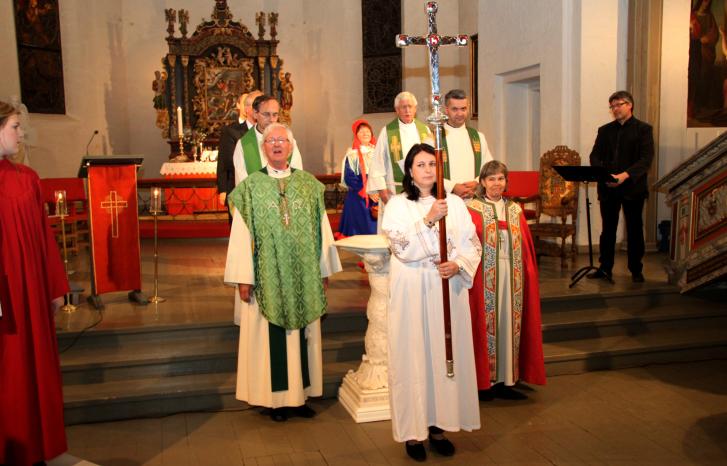Hansen, who took her master’s degree at the Faculty of Theology, says that she has had a long-standing interest in gender and religion. Her interest in the Pentecostal church specifically arose as a result of meeting her partner’s family, who have links with the church:
– They did not fit with the image I had of Pentecostal Christians. My preconceptions were probably quite ill-informed, she says.
– Meeting them was a transformative experience for me. Since then, I have wanted to learn more about the Pentecostal movement.
Hansen was intrigued by the apparent contradictions regarding gender within the church:
– Pentecostal churches often seem quite modern and have many young members. Yet they promote conservative views regarding relationships, she says.
– Theologically, the church is dominated by patriarchal views on gender, and fairly traditional gender roles. At the same time, the church is growing many places in the world, and is popular among women.
Title: Gender, Cohabitation, and the Norwegian Pentecostal Church: Relationship Classes as a Frame for the Performative Role-Playing of Daily Life [Kjønn, samliv og norsk pinsekristendom. Samlivskurs som ramme for hverdagens performative rollespill]
Submitted to: The Faculty of Theology (TF), University of Oslo
Nominated by: Supervisor Elisabeth Tveito Johnsen
Jury: May-Len Skilbrei, Kristin Engh Førde, Niels Nyegaard
Understanding the «Pentecostal gender paradox»
Hansen’s thesis looks at how gender and cohabitation are negotiated at relationship classes organized by the Norwegian Pentecostal church. Previous research in this field has pointed to a «Pentecostal gender paradox»: while some scholars assert that the church promotes traditional gender roles, others argue that the church allows for gender equality.
Hansen’s research presents a more complex picture. Her findings indicate that attitudes towards gender and relationships within the church cannot be deemed wholly conservative or progressive. Instead, Hansen points to significant individual variations and openness to different ways of «doing» gender and relationships.
In their justification, the jury emphasizes that Hansen has carried out observations in a relatively closed environment. In so doing, she has generated new knowledge about gender and relationships within the Norwegian Pentecostal church. Perhaps even more important is the project’s theoretical contribution. By combining gender theory with sociological theory that focuses on everyday interactions, Hansen has coined a new theoretical term: «everyday performativity». This makes Hansen’s research an important contribution to the field of gender research.
Relationship classes as a source of knowledge
To understand how gender and relationships are negotiated within the Pentecostal movement, Hansen decided to study relationship classes organized by the church:
– Romantic relationships and cohabitation are gendered arenas, and therefore a relevant and exciting point of departure for studying gender, she says.
– Looking at these classes enabled me to get to the core of how gender and relationships are negotiated within the church.
They were skeptical towards my study, and towards me as a student.
Her chosen methodologies were participant observation and interviews:
– Observing these classes made it possible to gather comprehensive information about how gender and romantic relationships are expressed through patterns of interactions. Meanwhile, the interviews enabled me to ask questions about what I had observed, and acquire more detailed information. It was also important for me to approach my research question and the themes I was exploring through the informants themselves. I wanted to highlight their reflections and perspectives.
Participants were sceptical
This is the first time relationship classes have been used to acquire knowledge about gender and cohabitation within the Pentecostal church. Hansen explains that accessing the classes was the most challenging aspect of her project:
– They were skeptical towards my study, and towards me as a student. I had to renegotiate my access several times. Due to certain regulations, I was repeatedly forced to make changes in the study.
The theoretical framework of the thesis has been particularly important in pushing beyond the dichotomous understanding of the church as either conservative or progressive.
– Because I wanted to understand how gender and romantic relationships are negotiated in relationship classes, both gender theory and theory on social interactions were useful to me, she says.
However, the thesis provides a more multifaceted understanding of what occurs during the relationship classes. Hansen observed both conventional and non-conventional presentations of gender and relationships:
Conventional relationships under pressure
– A monogamous, life-long commitment is still framed as the ideal, but stories shared by the instructors showed that understandings of gender are not wholly dependent on the heterosexual couple, as Butler would claim, forteller hun.
– Though the heterosexual matrix is clearly present in the empirical material, understandings of gender are not consistently and completely dependent upon a heteronormative framework.
Hansen points to the huge changes that have occurred in society more generally when it comes to understandings of gender and relationships:
– Conventional ways of living are now under pressure, and it seems that traditional views on gender and cohabitation are becoming controversial.
Oscillating between different positions
The findings in the thesis show that the «Pentecostal gender paradox» cannot adequately convey the nuances in how gender and cohabitation are understood within the Pentecostal church. Participants are not simply traditional or nontraditional when it comes to these issues, but can move back and forth between different positions.
Different understandings of (gender) identity and cohabitation are not «permissible» or «impermissible».
In an attempt to describe her findings, Hansen has coined the term «everyday performativity».
– Different understandings of (gender) identity and cohabitation are not «permissible» or «impermissible». Rather, negotiations take place between these extremes. This is the space that I call «everyday performativity».
As the jury points out, Hansen’s term can be used and developed by other scholars within gender studies. This makes her thesis an important contribution to the field.
Moving forwards
Hansen has put her knowledge of gender and social negotiations to good use after submitting her thesis. She is now a project coordinator at the MiRA Resource Centre for Black, Immigrant and Refugee Women, where she works on issues relating to gender equality and integration.
An academic career might still be on the cards, however:
– I would like to do more work with a gender perspective, and I would definitely like to apply for doctoral positions in the future.
Translated by Anna Young.
A longer version of this article was first published at stk.uio.no



